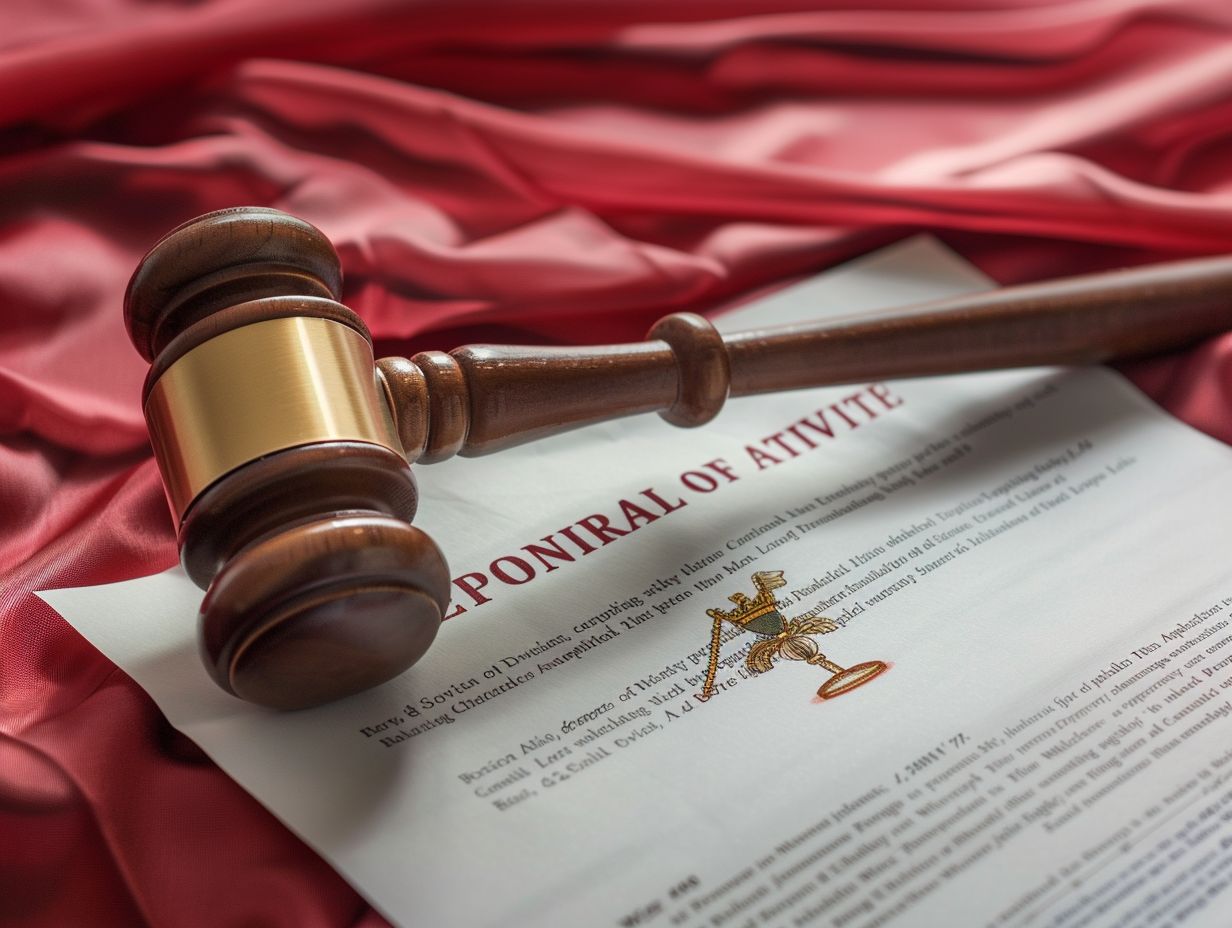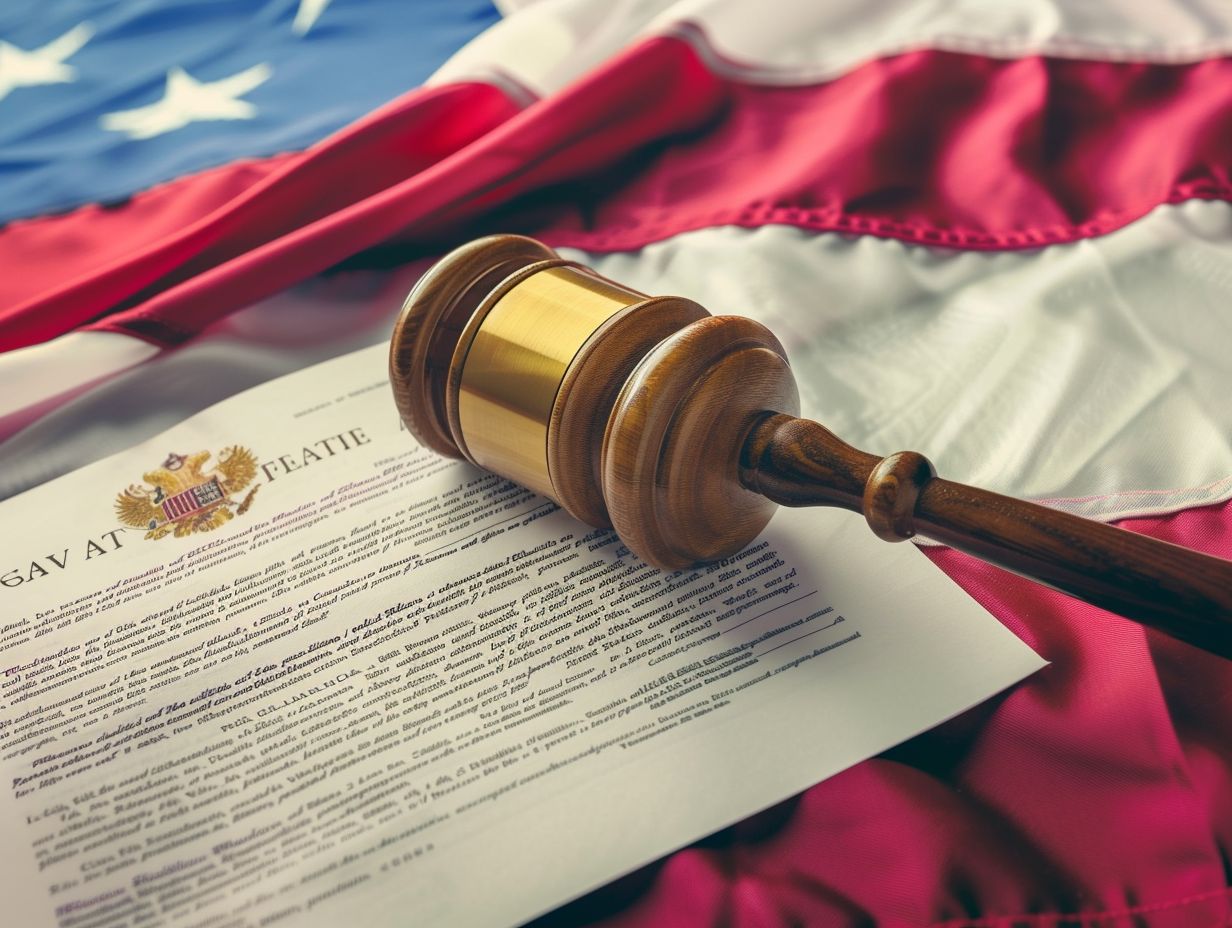Are you familiar with the concept of a Power of Attorney and its significance in Florida? Understanding the different types, creation process, responsibilities of an agent, limitations, revocation, and consequences of not having one are crucial for residents of the Sunshine State.
This article delves into Florida’s laws on Power of Attorney to provide you with a comprehensive guide on this essential legal tool.
Learn everything you need to know about Power of Attorney in Florida.
Key Takeaways:

- A Power of Attorney is a legal document that grants someone else the authority to make decisions on your behalf in Florida.
- Having a Power of Attorney in place is important in Florida as it allows for the smooth management of your affairs in case of incapacity or absence.
- The four types of Power of Attorney in Florida are General, Limited, Durable, and Springing. Each type grants different levels of decision-making authority.
What Is a Power of Attorney?
A Power of Attorney is a legal document that grants an agent the authority to act on behalf of a principal in various matters, including financial transactions, healthcare decisions, and other personal affairs.
The agent, also referred to as the attorney-in-fact, is entrusted with the responsibilities outlined in the Power of Attorney document. They are legally obligated to act in the best interests of the principal, making decisions and executing tasks as specified.
The principal, on the other hand, is the individual who grants this authority to the agent, giving them the power to make important choices when the principal is unable to do so themselves. This document is not only crucial for aging individuals but also for those facing health issues or frequent travel, ensuring their affairs are managed efficiently.
Why Is a Power of Attorney Important in Florida?
In Florida, having a Power of Attorney is important as it allows individuals to appoint trusted agents to manage their affairs if they become incapacitated, thereby avoiding the need for guardianship proceedings.
This legal document plays a significant role in estate planning, giving individuals control over who will make important decisions on their behalf. It provides broad or limited powers to the designated agent, allowing them to handle financial transactions, real estate matters, and healthcare decisions.
By establishing a Power of Attorney, individuals can ensure that their wishes are carried out smoothly without the involvement of a court-appointed guardian, which can be expensive, time-consuming, and intrusive.
Having a Power of Attorney in place offers peace of mind for both the individual and their loved ones, knowing that their affairs are being managed competently.
What Are the Different Types of Power of Attorney in Florida?
In Florida, various types of Power of Attorney exist, each fulfilling distinct purposes and granting different levels of authority to the agent. These types include General, Limited, Durable, and Springing Power of Attorney.
1. General Power of Attorney
A General Power of Attorney provides the agent with broad authority to handle a wide range of financial transactions and legal matters on behalf of the principal. This includes making decisions related to property management, banking transactions, tax filing, investments, and contract agreements.
The agent may also have the power to initiate or defend legal actions, such as signing legal documents, representing the principal in court, and resolving disputes. The extensive scope of powers granted under a General Power of Attorney enables the agent to act in multiple capacities to safeguard and promote the best interests of the principal.
2. Limited Power of Attorney
A Limited Power of Attorney limits the agent’s authority to particular tasks or transactions, usually for a specific timeframe or purpose. For example, in real estate, a Limited Power of Attorney might be given to a trusted individual to sign documents for the property owner during a home sale, ensuring a smooth transaction even if the owner is absent.
Similarly, in financial matters, a Limited Power of Attorney could be used to authorize someone to oversee specific investment accounts or manage tax-related duties, providing flexibility and convenience while retaining control over the specified areas.
3. Durable Power of Attorney
A Durable Power of Attorney remains effective even if the principal becomes incapacitated, ensuring that the agent can continue to manage the principal’s affairs without interruption.
The durability feature is particularly important for situations in which the principal may experience a sudden illness, accident, or age-related conditions that leave them unable to make decisions.
For example, in the event of a medical emergency where the principal cannot communicate their wishes, having a durable power of attorney allows the appointed agent to make healthcare decisions on their behalf. Similarly, if the principal loses mental capacity due to conditions such as dementia, the agent can handle financial matters and ensure that the principal’s bills are paid and assets are effectively managed.
4. Springing Power of Attorney
A Springing Power of Attorney is a type that only becomes effective upon the occurrence of a specified event, such as the principal’s incapacity.
This differs from other types of Power of Attorney, like a Durable Power of Attorney, which takes effect immediately upon signing.
In a Springing Power of Attorney, the agent is unable to act on behalf of the principal until the triggering event happens, allowing the principal to maintain control until necessary. This feature can be particularly advantageous for individuals who wish to retain autonomy and authority while preparing for potential future incapacity scenarios.
The careful timing and activation process of a Springing Power of Attorney serve as a safeguard against misuse or premature delegation of decision-making power.
How Do You Create a Power of Attorney in Florida?
The process of creating a Power of Attorney in Florida includes various essential steps such as:
- Choosing a reliable agent,
- Specifying the powers to be delegated, and
- Composing and signing the document in front of a notary public.
1. Select an Agent
The initial step in creating a Power of Attorney involves the selection of a reliable agent who will act in the best interest of the principal and uphold a fiduciary relationship.
During the process of choosing an agent for a Power of Attorney, it is critical to take into account several key qualities. Trustworthiness is of utmost importance since the agent will be responsible for making significant decisions on behalf of the principal.
Effective communication skills are necessary to ensure that the agent accurately executes the principal’s directives. Integrity and a strong ethical compass are crucial for maintaining the fiduciary relationship. By establishing trust and transparency with the chosen agent, the principal can have peace of mind knowing that their interests will be safeguarded in all circumstances.
2. Determine the Powers to be Granted
The next step involves determining the specific powers to be granted to the agent, which can vary from broad financial decisions to specific tasks and may include durable provisions. Common powers found in Power of Attorney documents include the authority to manage real estate transactions, make healthcare decisions, handle banking and financial matters, access safe deposit boxes, and file taxes.
Powers related to managing investments, conducting legal proceedings, and making gifts or charitable contributions can also be included, depending on the individual’s preferences and needs. It is essential to carefully consider which powers would best serve the principal’s interests and ensure that the agent is equipped to fulfill their responsibilities effectively.
3. Draft and Sign the Document
The final step involves drafting and signing the Power of Attorney document in the presence of a notary public to ensure it complies with all legal requirements and is recognized by financial institutions.
This important step provides an additional level of security and validity to the document, as the notary public acts as an impartial witness to the signing process. By verifying the signatures, the notary public helps prevent fraud and confirms the authenticity of the Power of Attorney.
Once the document is notarized, it transforms into a potent legal tool that can be presented to financial institutions for various transactions and decision-making processes. The acknowledgment by the relevant financial institutions further solidifies the authority granted by the Power of Attorney, establishing a clear chain of accountability.
What Are the Responsibilities of an Agent in a Power of Attorney?
A person acting under a Power of Attorney has important responsibilities, which include:
- Acting in the best interest of the individual granting the power
- Making financially sound decisions
- Keeping detailed records of all transactions and activities carried out
1. Act in the Best Interest of the Principal
The agent is obligated to act in the best interest of the principal, fulfilling their fiduciary duty to manage the principal’s affairs responsibly and ethically. This duty necessitates the agent to make decisions that prioritize the principal’s well-being over their own interests.
For instance, when negotiating contracts on behalf of the principal, the agent must pursue the best terms possible, even if it requires sacrificing potential personal gains. The agent is expected to disclose all relevant information to the principal, ensuring transparency and knowledge-based decision making.
By consistently prioritizing the principal’s interests in all actions and decisions, the agent maintains the trust placed in them and upholds a strong ethical standard in their professional relationship.
2. Keep Accurate Records
It is crucial for an agent to keep accurate records of all financial transactions and decisions. In some instances, an annual accounting may be necessary.
Maintaining detailed records is an important tool for evaluating the financial well-being of a business, monitoring income and expenses, and ensuring compliance with tax requirements. Documenting sources of income, expenses, investments, loans, and transactions related to properties or assets is essential.
Organizing these records systematically, whether by month or category, can simplify the preparation of financial statements and tax returns. Detailed records offer valuable insights that aid in informed financial decision-making and support long-term business growth.
3. Avoid Conflicts of Interest
An individual must avoid conflicts of interest, ensuring that their actions and decisions are always aligned with the principal’s best interests rather than their own personal gains.
In real estate, a common scenario where conflicts of interest may arise is when an individual represents both the buyer and the seller in a transaction. To mitigate this conflict, individuals should have transparent communication with all parties involved and obtain written consent from both the buyer and seller.
Another scenario is in financial advising, where an individual may recommend certain products that offer them higher commissions, even if there are better options for the client. Individuals can address this by fully disclosing any conflicts of interest and offering unbiased advice that prioritizes the client’s financial goals.
What Are the Limitations of a Power of Attorney in Florida?
A Power of Attorney grants substantial authority to an agent, but there are specific limitations to be aware of, including the inability to make decisions after the principal’s death or certain healthcare decisions that necessitate separate authorization.
1. Cannot Make Decisions After the Principal’s Death
Upon the principal’s death, the authority granted under a Power of Attorney ceases, and any decisions must be made by the executor of the principal’s legal will.
The executor plays a crucial role in managing the distribution of the principal’s assets according to their will. They are responsible for settling debts, selling properties if necessary, and ensuring that the beneficiaries receive their inheritance as outlined.
The executor acts as the legal representative of the deceased, handling any legal proceedings or disputes that may arise during the estate settlement process. Their primary duty is to uphold the wishes of the deceased while ensuring that everything is carried out lawfully and in the best interests of the estate and its beneficiaries.
2. Cannot Make Decisions Regarding Healthcare
In Florida, a Power of Attorney does not grant the agent authority to make healthcare decisions, which requires a separate document known as the Designation of Health Care Surrogate.
This distinction between financial and healthcare powers is crucial for individuals to understand, as it ensures that decisions concerning medical treatment and care are made by a designated surrogate who understands the individual’s wishes.
The Designation of Health Care Surrogate allows a trusted individual to step in and make important healthcare decisions on behalf of the individual if they are unable to do so themselves. This document provides peace of mind knowing that one’s medical preferences and best interests will be upheld even if they are incapacitated.
How Can a Power of Attorney Be Revoked in Florida?
In Florida, a Power of Attorney can be revoked by the principal at any time, provided they have the legal capacity to do so, through a written notice or by creating a new Power of Attorney document.
The legal requirements for revoking a Power of Attorney may vary depending on the specific terms outlined in the original document. It is crucial for the principal to notify all relevant parties involved, such as financial institutions or healthcare providers, of the revocation to ensure that the agent’s authority is no longer recognized. If the agent refuses to relinquish power or if there are concerns about the principal’s capacity to make decisions, court intervention might be necessary to address and resolve the situation.
What Happens if You Don’t Have a Power of Attorney in Florida?
If an individual becomes incapacitated without a Power of Attorney in place, their loved ones may have to pursue guardianship through the court system. This process can be time-consuming, costly, and potentially contentious.
Guardianship is a legal procedure where a court appoints a guardian to make decisions on behalf of the incapacitated person. This involves proving the individual’s incapacity and determining their best interests. Without proper legal documentation, such as a Power of Attorney, court intervention becomes necessary to ensure the person’s affairs are managed appropriately.
Seeking guardianship can entail complex legal procedures, evaluations, and hearings. It is essential for family members to seek legal advice to navigate this process effectively and safeguard the well-being and interests of the incapacitated individual.
Frequently Asked Questions
What is a power of attorney in Florida?
A power of attorney in Florida is a legal document that allows an individual (referred to as the “principal”) to appoint another person (known as the “agent” or “attorney-in-fact”) to make decisions on their behalf. This document grants the agent authority to act in the principal’s best interests and manage their affairs if they become incapacitated or unable to make decisions for themselves.
What types of powers of attorney are recognized in Florida?
Florida recognizes two types of powers of attorney: durable and limited. A durable power of attorney allows the agent to continue acting on behalf of the principal, even if they become incapacitated. A limited power of attorney grants the agent specific powers for a limited period of time or for a specific purpose.
Do I need a lawyer to create a power of attorney in Florida?
While it is not required by law, it is highly recommended to seek the assistance of a lawyer when creating a power of attorney in Florida. An experienced lawyer can ensure that the document meets all legal requirements and accurately reflects the principal’s wishes.
What are the responsibilities of an agent under a power of attorney in Florida?
An agent under a power of attorney in Florida has a fiduciary duty to act in the best interests of the principal. This includes managing the principal’s finances, making healthcare decisions, and handling other important affairs. The agent must also keep accurate records and provide regular updates to the principal.
Can a power of attorney be revoked in Florida?
Yes, a power of attorney can be revoked in Florida as long as the principal is mentally competent. This can be done by creating a new power of attorney that revokes the previous one, or by physically destroying the document and notifying the agent in writing.
When does a power of attorney become effective in Florida?
A power of attorney becomes effective immediately upon signing, unless otherwise stated in the document. If the power of attorney is durable, it remains effective even if the principal becomes incapacitated. However, if the power of attorney is limited, it only becomes effective at the specified time or upon the occurrence of a specific event.
























Rate this article:
Average rating 0 / 5. Vote count: 0
No votes so far! Be the first to rate this post.
No Comments yet!